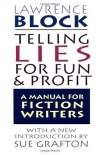Manual For Fiction Writers by Block, Lawrence (classic books to read .TXT) 📗

Book online «Manual For Fiction Writers by Block, Lawrence (classic books to read .TXT) 📗». Author Block, Lawrence
Aha!
A couple of weeks later I began a book about a young man, his sleep center permanently destroyed by a shrapnel fragment, and a devotee of all lost causes, restoration of the House of Stuart just one among many, who goes to Turkey and damn well finds that Armenian gold. I called him Evan Tanner, I called the book The Thief Who Couldn't Sleep, and I wrote seven books about the chap before he quit on me and stretched out for forty winks.
If I'd tried writing about Tanner when I first got the idea of insomnia as a character trait, I'd have had no story for him and my mind wouldn't have had time to keep him on the back burner while his character defined itself. If I'd forgotten him entirely, if I'd dropped the insomnia notion once I failed to find an immediate use for it and had let it stay permanently dropped, the item about the Armenian gold cache would have led at best to a routine foreign-intrigue chase with stereotyped characters. But everything came together, and I had as much fun writing those seven Tanner books as I've ever had with my clothes on.
People give you ideas. In the vast majority of cases, those who say they have great ideas for stories are quite wrong. They don't. The people who do provide good story ideas are almost invariably other writers or people in publishing.
What? Other writers give away good ideas? Are they crazy or something? Oh, yes, they'll give away ideas, and they're not crazy at all. Everybody does it. The fact that I might have an idea that ought to make a good novel or short story is not reason enough in and of itself for me to write it. It might be the foundation of a good story without being my kind of story. Either I wouldn't have any fun with it or I wouldn't do a good job with it?or most likely both. So I'll give it to someone else.
Publishers are far more likely to give away book ideas. In a sense they're not giving anything away; they supply the author with the idea and contract to publish the book once he's written it. This happens rather more frequently than the reading public realizes. There are quite a few writers who spend most of their time working up novels from ideas supplied by publishers. I'm not just talking about lower-level writers knocking out formula paperback fiction to order, but carefully calculated and well-promoted best-selling novels the ideas of which, and sometimes a fair portion of plot and characterization, originate with the publisher.
There is a very real danger in working from an idea that is spoon-fed to you in this manner. When an idea is your own, the odds are that it's been kicking around in your subconscious for a long time, and as you work on it you'll be bringing all of that subconscious concentration to bear on it. When you're working with someone else's idea, unless you like it a great deal right from the start, you won't improve it as you go along. That's why so many books developed in this fashion, written by good writers and based on commercially sound ideas, turn out flat and mechanical.
I wrote one book which I stole?with permission?from another writer. He had a premise, a bride is raped on her wedding night and the groom hunts down the bad guys. And he had a title, Deadly Honeymoon. I stole them both.
I waited over a year to do it. Then, when I couldn't get to work on anything else and couldn't get Deadly Honeymoon out of my mind, I called him up and asked him if he was going to do anything with the idea?he wasn't?and did he mind if I did. He didn't. I had the bride and the groom hunt the villains, and Macmillan published it and Dell reprinted it and the movies kept optioning it and dropping it and it was like an annuity for a while there.
Writers get ideas the way oysters get pearls. There are those who would hold that all creative ideas are spun out of one's neurotic defenses. That may be going a little far, but sometimes the process is fairly obvious. Several years ago I was in a state of depression that made Schopenhauer look positively giddy. Every day I got up a little after noon and played solitaire until it was time for dinner. Then I played solitaire for a few more hours and then I drank myself to sleep. I must have been sensational company.
I would try to write now and then but I couldn't seem to motivate a character. I couldn't think of a sound reason for anybody to do anything. Ever. I would get a plot notion and think, Hell, why doesn't





Comments (0)